ENVIRONMENT
The Environment Section is responsible for a range of statutory and non- statutory functions with County Carlow including:
• Environmental Compliant Management
• Waste Management – Enforcement, Licencing & Powerstown
• Litter Prevention & Control
• Recycling Services
• Environmental Education & Awareness
• Water Pollution/Water Framework Directive
• Farm Inspection and Nutrient Management
• Environmental Planning
• Air Pollution
• Noise Pollution
• Burial Grounds
• Rural Water/Small Private Supplies
• Veterinary
• Miscellaneous Environmental Legislation/Energy
Each year as part of Carlow County Council’s commitments and obligations under EU & State rules, an RMCEI Plan (Recommended Minimum Criteria for Environmental Inspections) is developed outlining Carlow County Council’s inspection objectives. The RMCEI contains non-binding criteria for the planning, carrying out, following up and reporting on environmental inspections. Its objective is to strengthen compliance with EU environment law and to contribute to its more consistent implementation and enforcement in all Member States.
National Waste Enforcement Priorities
The National Waste Enforcement Priorities 2017 were as follows;
• Illegal dumping including construction and demolition waste;
• Household waste management compliance including brown bin;
• End- of-life vehicles;
• Tyres - producer responsibility initiative (PRI)
• Packaging Regulations
Anti-Dumping Initiative
The Environment Department has been successful in their application to WERLA under the National Anti-Dumping Initiative Scheme 2017.
A total of €22494.80 was secured in round one, with a further €19,331.50 secured in round 2.
Funding was granted under the following projects:

Projects include a mixture of area clean-up projects combined with temporary covert CCTV.

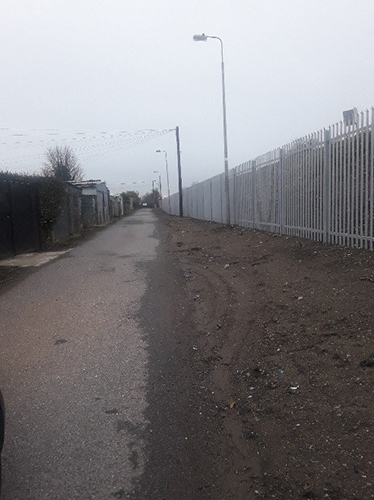
The initiative at St. Killians crescent commenced in September in Partnership with Irish Rail, Eir and local residents. Over 250 tonnes of waste was removed from the site.
Local Authority Environmental Enforcement 2014 – 2016 Performance Report
The EPA has assessed the environmental performance of local authorities using 26 environmental indicators based on three years of inspection and enforcement data from 2014 to 2016. Annually environmental inspection and enforcement activities undertaken by Carlow County Council are as follows:
• 1,700 environmental inspections per year
• Over 200 enforcement actions
• handling of 1,100 environmental complaints per year, such as litter, illegal dumping, water pollution, air and noise complaints
Overall Carlow’s result for 2014 – 2016 was rated as ‘Above Target’. The focus for 2018 will be to address all areas that require improvement and systems are being reviewed/developed in this regard.
Bring Banks/Civic Amenity Site
Carlow County Council provide 25 free recycling facilities throughout the Town and County. These Civic sites take a wide range of clean dry recyclable materials including Glass, Cans and Tins. These sites are for domestic users only. The facilities are emptied by a regional contract with Kilkenny, Waterford, Tipperary and Wexford. The contract will be reviewed in 2018 to ensure that there is adequate frequency of collections It is an offence to leave materials in any other place other than in the recycling units. If the units are full, another facility should be used or recyclables kept until the banks have been emptied.
856 tonnes of recycled materials were deposited at the 26 free civic amenity sites across the County in 2017.
• 826 tonnes of Glass
• 5 tonnes of Steel (food cans)
• 25 tonnes of Aluminium (Drink cans)
The Civic Amenity Site at Powerstown continues to offer a wide range of recycling options for item that can be placed in the domestic recycling bin or for additional items including:
• Plastic (Uncontaminated – Bottles/ Fruit Trays)
• Plastic Wrapping (Uncontaminated)
• Tetra Pac (Milk/ Juice Cartons - Uncontaminated)
• Waste Oil (Engine & Cooking)
• Oil filters
• Batteries (Car & Household)
• Fluorescent Light Tubes & Bulbs
• Mobile Phones
• Printer /Toner Cartridges
• Scrap metal (Bikes/ Iron baths/ Gas Heaters)
• Clothes (Reusable Only)
• Oil based paint and varnishes only
• Polystyrene
• Small Aerosol Cans
• Domestic Food Waste
• Waste Electrical and Electronic Equipment (WEEE)
Green Waste, Timber, Flat Glass, Mattresses and Gypsum are also accepted at a charge to cover collection costs.
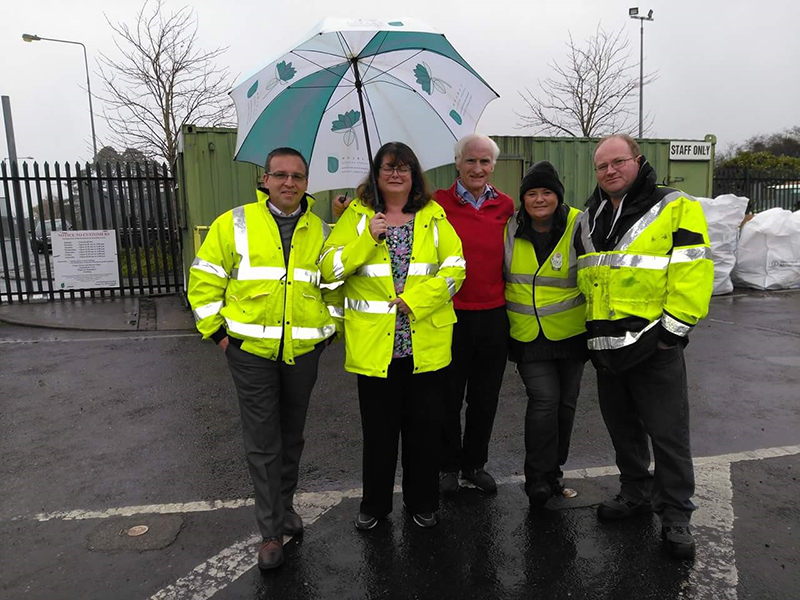
Staff of the Environment Section being Interview for ‘Eco Eye’ at Kernanstown Recycling Centre.
Domestic Waste Collections
A number of changes have been introduced Nationally to Domestic Bin Collection Services. As part of the National Waste Priorities, Carlow County Council are conducting door to door survey and inspections of waste collectors. Joint Inspections were conducted with the Southern Waste Management Office (SWMO) and The Waste Enforcement Regional Lead Authorities Office (WERLA). These inspections will continue to ensure that collectors are compliant with their obligations. The main changes that have been introduced are:
• Food Waste - With effect from July 2017 collectors are obliged to roll out a Brown Bin Service to population centres with more than 500 residents. Very small population areas and small islands, where it is not practical to collect food waste separately, will not be covered
• 'All-in flat rate' charging for household waste to be phased out as customers renew or enter new service contracts. Collectors are required to introduce incentivised pricing options to their customers. These options include elements or combinations of standing charges, and per-lift, per-kilogramme, weight-bands, and weight allowance charges.
• Tag-a-bin systems are discontinued in Carlow from September 2017.
• A new list covers the items that can be recycled in the domestic recycling bin was launched on National Media. Customers are encouraged to have a copy of the list available to ensure that recycling bins aren’t contaminated by non-recyclables.
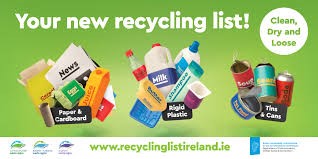
Tyres and Waste Tyre Regulations
The new Waste Management (Tyres and Waste Tyres) Regulations 2017 introduced new regulatory structures for the tyre sector with effect from 1st October 2017. These regulations build on the allocation of €1million to clean up stockpiles of waste tyres, which are illegally dumped around the countryside, potentially causing toxic fire threats and damage to human health.
The new regulations for the tyre sector will introduce a full compliance scheme to be operated by Repak ELT with a registration and reporting role for the Producer Register Limited (PRL). The scheme will be based on the Producer Responsibility model that has worked successfully in this country for other waste streams such as packaging, batteries and waste electrical, electronic goods (WEEE). As part of the scheme it will be a requirement that all parties handling waste tyres are registered. Inspections in this area commenced in mid-October. 32 letters were sent to potential scheme participants at the beginning of October 2017 and inspections have commenced.
The new structures will be funded by a visible Environmental Management Cost (vEMC) of €2.80 per car tyre and €1.50 per motorcycle tyres. Further vEMCs will be introduced in due course for truck, construction and agricultural tyres.
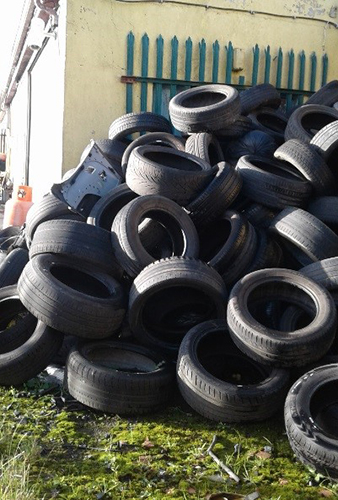
Packaging Regulations
One of the National Waste Priorities in 2017 was to ensure compliance of major producers with the packaging regulations. In September, 2 joint site visits with WERLA took place to complete an audit. The Environment Section acknowledge the positive engagement of companies in the process. These sites are compliant with the regulations and are members of Repak.
Green Schools
Green Schools in Carlow were awarded their next Green Flag at the Regional Awards ceremony in Hotel Kilkenny 23rd May 2017.
14 Flags awarded were as follows:
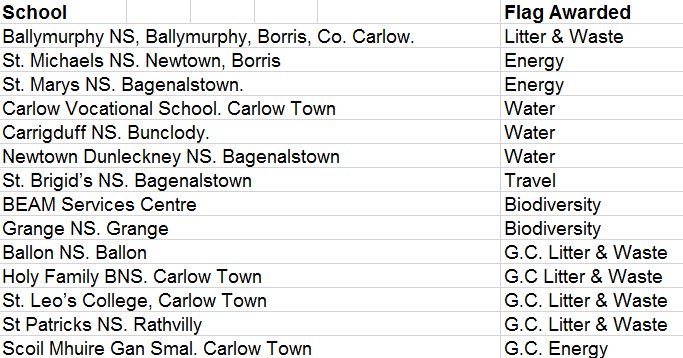
The Green-Schools “Water School of the Year Awards
The Green-Schools “Water School of the Year Awards” recognises the dedication and innovation shown by schools that have been working on the Water theme and celebrates those that are receiving the internationally recognised Green Flag for Water this year.
This year local school, Newtown Dunleckney NS was named as a Water School of the Year for the Eastern Midlands region.

St. Leos’ transition year student Emily Miller was named as one of the winners of the Green-Schools ‘Global Goal 6: Clean Water and Sanitation’ Poster Competition.
National Tidy Towns 2017
Congratulation to all participants in the Tidy Towns and to see Carlow continue as one of the top performers in the Country. Clonegal and Leighlinbridge maintained their gold medal status while Carlow Town received a silver medal and Clonmore a Bronze Medal. Borris won the Endeavour Award with a 9-point increase (highest % increase) on last year. There were 21 entrants in the competitions with many increasing their points reflecting the dedication and hard work of the Tidy Towns Committees and their volunteers. Individual Reports are available here.
Carlow Town Centre Project (#cleancarlow)
A clean up event of Carlow Town Centre took place Sat 16th September 1-7pm. The event was a great success with over 100 volunteers participated in the day. A mixture of Community Groups, Business, Agencies and families including: - All Carlow Town Schools, Carlow Tidy Towns, IT Carlow, All Sporting Organisations, Carlow County Development Partnership, Carlow Mental Health Association, Scouting Groups, Local Business, Tullow Road Development Association, Carlow Men’s shed, Carlow Graiguecullen Sub Aqua Club, Pop up shop in Potato Market courtesy of Niall Mcloughlin, Carlow County Council, (Environment Dept. & Local Enterprise Office), Carlow Chamber of Commerce (Love Carlow) and Carlow Volunteer Centre.
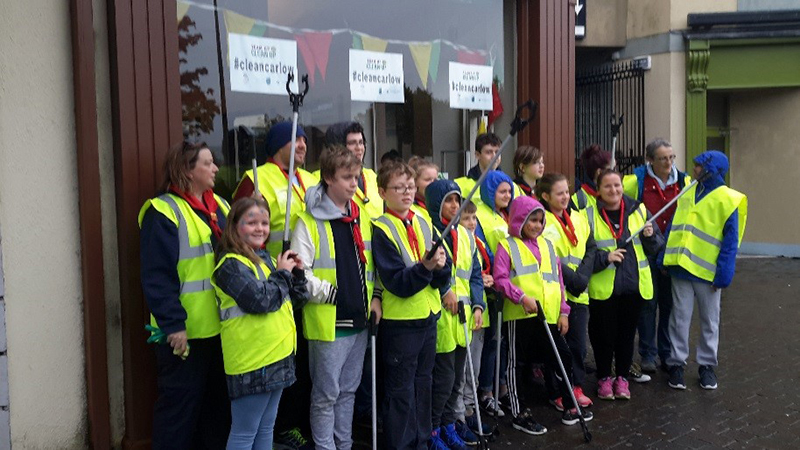
Materials Collected:
• 40 Bags of Waste (75% of this waste was recyclable for free)
• Cigarette Butts were the biggest offenders in the Town Centre, followed closely by disposable cups and plastic bottles.
• Carlow Graigucullen Sub Carlow Graiguecullen sub aqua team got into the river Burrin and collected over 70 trollies and bikes.
• Oddities collected included Tables & Chairs, a 3 foot oxygen tanks and a lucky tenner.
• The issue of abuse of public bins by those in our society who use them to dispose of their own domestic waste was highlighted as was the issue of dog fouling.
The support of KCLR (Eimear Ni Bhrennan) and Carlow Nationalist for helping in the promotion of the event added to the success of the day.
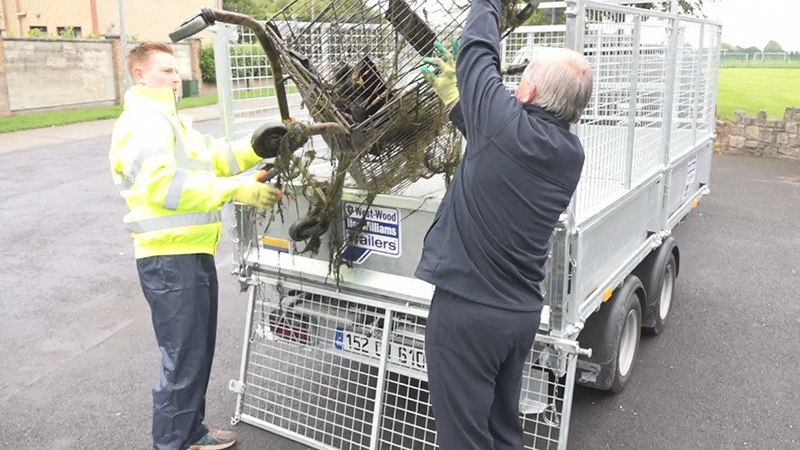
Litter Fines Issued 2017
In 2017 a total of 160 litter fines were issued and there were 27 court appearances. The continued use of illegal waste collectors is identified as one of the main contributors in illegal dumping throughout the county. Carlow County Council will continue to be proactive in these investigations and will conduct door to door surveys to ensure that households and businesses are using authorised collectors.
Environmental Inspections
Carlow County Council under its annual inspection plan (RMCEI) conducted the following planned inspections in 2017:
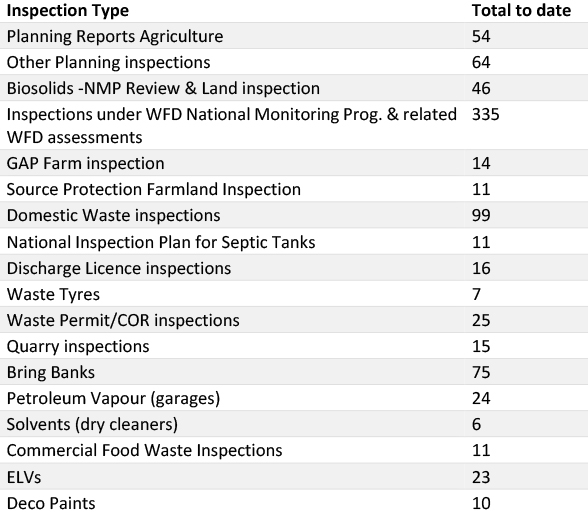
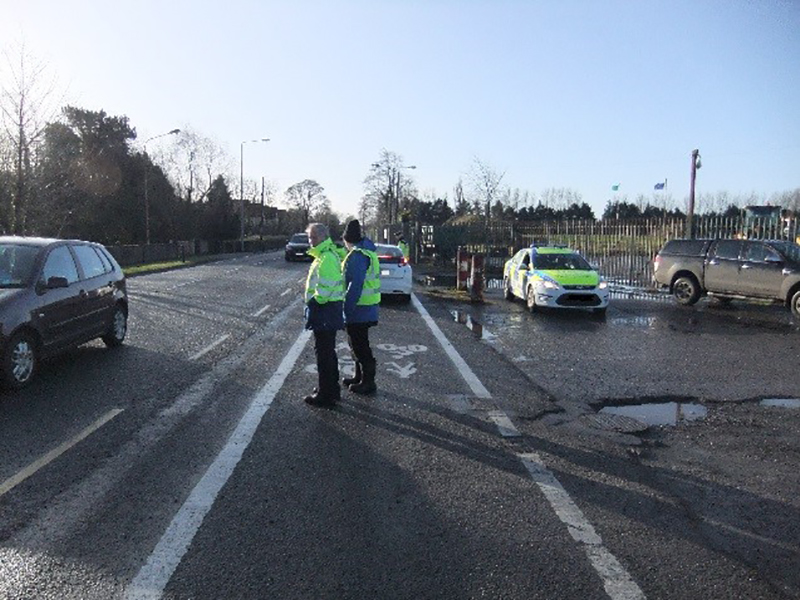
Joint Garda/Revenue/Carlow County Council check point at Athy Road, Carlow
Complaints
Much of the activity in the Environment Section centers around complaints received from the public with nearly 700 complaints being logged. The primary compliant type is litter and each compliant is investigated by enforcement officers. Complaints regularly end up with the issuing of a fine, notice or prosecution. The breakdown is presented below:
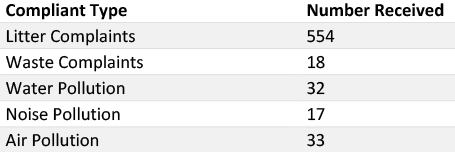
Powerstown Landfill
A tender was completed to engage consultants to design the final capping and restoration plan for Powerstown. Design work will be completed for agreement with the EPA in early 2018 with a view to commencing works in 2018. Some intermediate measures were carried out on site before the end of 2017 to provide temporary and permanent capping which will create more effective and efficient conditions for the flare operations.
Preparations are being made to close landfilling operations in 2018 and commencing collecting residual waste for transfer off site. This will involve a reorganisation of the entry facilities at the site. It is anticipated that landfilling operations will cease for commercial and domestic operations by the end of April 2018.
Letters of offer in respect Phase 4, Powerstown Community Fund were issued in November 2017. Works will commence in 2018.
Septic Tank Inspections
The Water Services (Amendment) Act 2012 also requires Local Authorities to complete septic tank inspections and report inspection to the Environmental Protection Agency. 15 inspections were carried out which exceeds Carlow minimum requirement for 2017.
Draft River Basin Management Plan
The draft River Basin Management Plan (RBMP) for Ireland was published on 28th February. The draft plan outlines measures aimed at protecting and improving the water environment and working towards achieving the Water Framework Directive’s (WFD) objectives. The Directive’s overarching objective is to achieve good water quality in our rivers, lakes, estuaries and other coastal waters. This is to be achieved through catchment-based river basin management planning.
Among the draft plan’s main measures are:
• planned investment by Irish Water of approximately €1.7 billion in wastewater projects, programmes and improved asset management over the period to 2021 - delivering new or upgraded wastewater treatment plants in 105 agglomerations or urban areas and bringing Ireland into compliance with the Urban Waste Water Treatment Directive;
• 353 risk assessments of drinking water sources by Irish Water by 2021;
• 50,000 farmers participating and implementing actions to improve the rural environment, including actions to improve water quality under the Rural Development Programme’s (RDP) €1.4 billion GLAS Scheme (2014-2020). To support these actions, the National Dairy Sustainability Forum will establish a dairy co-op-led pilot knowledge transfer programme on better nutrient management and farm point source pollution management. This will be implemented for dairy farmers supplying cooperatives;
• a ‘Blue Dot Catchments Programme’, a programme to create awareness and promote best practice to protect our highest quality waters;
• improved RBMP governance and delivery structures and development of a strengthened evidence base upon which to make decisions;
• establishment of a national water forum to increase stakeholder and public engagement on all water issues, including WFD implementation – this will involve expanding the remit of the existing Public Water Forum, a consumer forum for Irish Water customers; and
• Establishment of a comprehensive database for water abstractions greater than 25 cubic meters per day.
The plan is subject to a 6-month consultation period, the closing date for submissions is August 28th 2017. Carlow County Council has submitted a submission on the draft plan.
The Waters and Communities Office held a series of public meetings to discuss the natural waters at three locations in Carlow in May/June. Ann Phelan, Community Waters Officer for Carlow, presented information on the latest draft River Basin Management Plan, with details of how people can make submissions to the plan. Discussion was held on local interests such as; water quality, angling, heritage, biodiversity, amenity use or issues affecting the local water environment.
In additional, regional workshops took place in order to agree on sub-catchment inspection priorities, draft priorities have been agreed and will be presented to the South-east Regional Water and Environmental management Committee for approval. For County Carlow these sub-catchments are:
Slaney 12-16: Slaney from Baltinglass to Tullow
Dereen 12-9: Dereen upper reaches
Slaney 12-10: Dereen lower reaches and Slaney
Barrow 14-13: Burren
Barrow 14-10: Mountain
A request was made to include Old Leighlin Stream in the Priority Action Areas. This request is now being considered in the context of the publication of the final plan.
Rural Water Programme
There are 4 No Group Water Schemes in the Carlow County Council functional area. These are:
• Ballinabrannagh Group Water Scheme
• Glynn St Mullins Group Water Scheme
• Ballyellen Group Water Scheme
• Ballyloughan Group Water Scheme
Carlow County Council monitor these Group Water Schemes for water quality and administer the payment of Subsidies to the Group Water Schemes. Carlow County Council also supervise and manage the allocation of Capital Grants on a yearly basis. The following Capital Grants were allocated to the Group Water Schemes in 2017:

Carlow County Council also monitors, sample and supervise 34 Small Private Supplies around the County, mostly Schools and B&Bs on private wells. The HSE monitor and sample a further 67 Small Private Supplies for Carlow County Council.
Flood Relief Works
Over the past number of years the Office of Public Works in consultation with the Local Authorities have been undertaking a Catchment Flood Risk Assessment and Management Scheme (CFRAMS). Detailed flood modelling has taken place throughout County Carlow concentrating particularly on areas that have experienced fluvial flooding. These maps have been published on the Office of Public Works website. The Catchment Flood Risk Assessment and Management Scheme will guide future investment in Flood Protection Schemes and contribute to development decisions in the future.
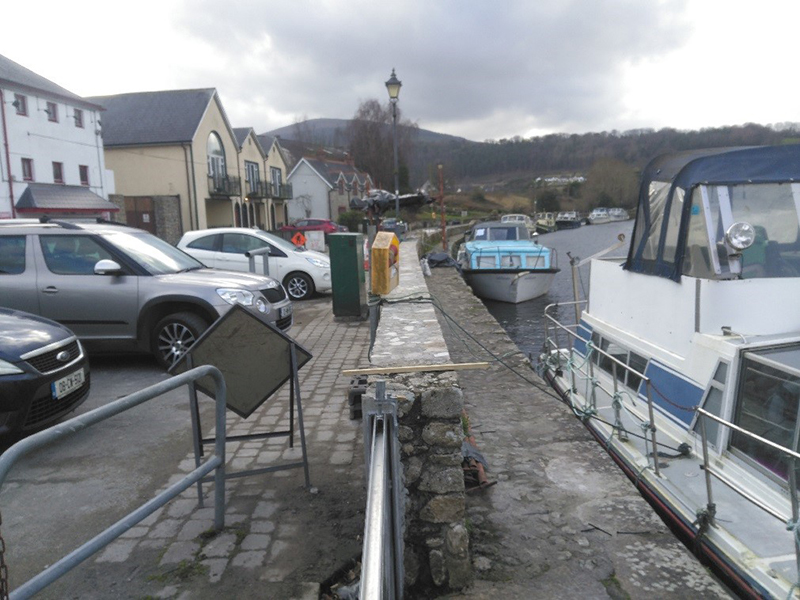
New wall at Tinnahinch
The Catchment Flood Risk Assessment and Management Study (CFRAMS) Maps have gone through the final consultation process. Amendments and changes have been made to the flood maps following feedback received from the Consultation Process. The revised maps are available to view on the Office of Public Works website: www.southeastcframstudy.ie.
Following on from ongoing work by the OPW on the CFRAM Project, Draft Flood Risk Management Plans have now been published for each River Catchment. The Flood Plans that affect Carlow are those for the River Barrow and the River Slaney. The Plans are being published to finalize the public consultation process on the Catchment Flood Risk Assessment and Management Programme.
The Flood Risk Management Plans will meet Ireland’s obligations under the 2007 EU Floods Directive (2007/60/EU). The Plans set out the measures that the OPW are proposing to recommend for the area covered by each plan and for each Area for Further Assessment within that Catchment.
Carlow County Council applied to the OPW for funding under the Minor Works Projects for the following locations:
• Fonthill
• Gotham Bridge
• Tinnahinch Quay
• Lock House, Tinnahinch
Areas identified where flooding has taken place or areas at risk of flooding will be considered for flood mitigation measures and the Office of Public Works in association with Carlow County Council will evaluate areas at risk. The following Schemes were carried out in 2017:

Individual Well Grants
Carlow County Council processes well grants for suitably qualified applicants.
Grants are up to a maximum of €2,031.58 per application or 75% of the costs incurred.

